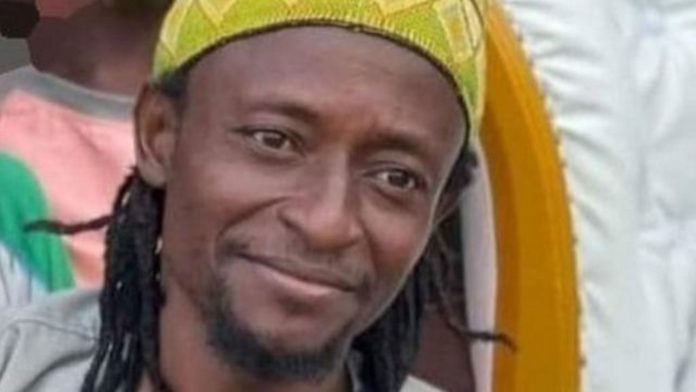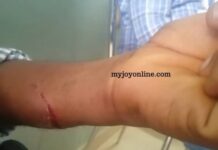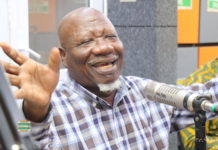
Press Statement of the Family of Ibrahim ‘Kaaka’ Mohammed in Relation to the
Report of the Ministerial Committee on the Ejura Killings
Monday, 04 October 2021
Introduction:
- Members of the Press, on behalf of the wider Kaaka family and the people of Ejura,
thank you for coming for today’s press event. - We are grateful that you continue to find it proper to shine your cameras on the plight
- of an unknown poor family from the middle of nowhere. A family of illiterates, who
have neither gold, fame nor the political connections that one needs to secure justice
in the version of democracy we practice. - But for your interest in our case, our continuous cry for justice, would have been heard
by only the walls that surround our modest family home in Ejura. - As you are aware, we have invited you here to share with you, formally this time, our
thoughts on the Report of the Ministerial Committee that was set up to look into the
Ejura killings. - Naturally, we are saddened that over 90 days after the Ejura incidents, it had to take a
freedom of information request from us, and the families of the victims of the Ejura
killings to compel the Government to release this report into the public domain for
discussion. - For us, the delay in releasing the report does not reflect any sense of urgency or
commitment to bringing justice to the people of Ejura. We think that the delay is
definitely inconsistent with the demands of our laws and with what our democracy
requires. - Over the past week, we have taken time as a family to read and discuss the Committee’s
report internally. We have sought the counsel of our lawyers, of our religious advisors,
friends and well-meaning sympathizers. We have conferred with the people of Ejura
and we have sat down with the families of the victims of the military brutalities in
Ejura. We have listened to those who have criticized the report and those who have
praised it. We have taken in stride the voices of those who spew hate against our
families, and we have even prayed for those whose hate and violent threats against us
have now become emboldened by this Report. - Most importantly, we have kept faith with Allah, in whom we have sought comfort; and
we have trusted his wisdom. - Today, we speak out again, because we continue to trust Allah’s promise that the moral
arc of the universe always bends towards justice; no matter how long it takes. - In this press conference, we will be addressing two issues that have become the focus
of the media attention since the report was released. - First, we will address the supposed findings of the Committee regarding the murder of
our son, husband and father Kaaka. And secondly, we will share with you the set of
actions we will be taking going forward, after this Report.
The Comments of the Kaaka Family on the Report of the Committee - Regarding the first issue; as you would recall, the Committee stated in its report, and I
quote; that (1) “We, accordingly, find that, the death of “Kaaka” was not directly linked
to his social media activism”. (2) It is more probably a family feud” - As you are aware, ever since the release of the report, several prominent and credible
people in our society have been baffled as to how the Committee could have arrived at
this conclusion. We thank the several of them who spoken up and criticized the obvious
absurdity and bizarre nature of this finding. We are grateful that they have shown
clearly how the Committee impoverished its own Report and diminished their own
credibility by amplifying propaganda and hatred for no discernible reason. - We will like to use this opportunity to state in clear and unambiguous terms, that the
statement by the Committee that Kaaka was probably killed because of a family feud is
obviously false, careless made, and very clearly disgraceful. - Their statement was made without regard for the pain of the family; and could only
have been made by persons who were so eager to please their appointing authority that
they left their humanity and their conscience aside. - Even though they knew that they had no basis, evidence or authority for that statement,
they made it anyway! Perhaps because, why bother about truth and justice for a poor
family in Ejura, when you can do the bidding of those who have promised you; and
have the power to guarantee you further political appointments. - So yes, we have struggled as to why persons of their calibre will be so willing to forsake
their own credibility just to do a hatchet job, in expectation of political favours. - But we leave them to the judgement of their conscience and to the weightier justice of
Allah. - As a family, we consider it necessary however that we walk the public through the facts;
and to demonstrate to you why the Report and the supposed findings of the Committee
are untrue, horribly careless and insensitive.
The Mandate of the Committee - First, it is important that we remind ourselves that the Ejura Committee, by their own
admission, had no mandate to investigate the death of Kaaka. They had no mandate to
establish who killed him or why Kaaka was killed. We as a Family understood that and
we made our peace with that. We say this, not because we do not want the truth of who
killed Kaaka to be officially established. But because, we want the persons connected
to his death, properly, carefully, and justifiably established. That is what justice means
to us. - If you remember, when the Committee was first set up, our family decided not to
appear before the Committee. We took the trouble to communicate our reasons in a
letter to the Minister of Interior and to the Committee. - As we told them, the reason why we decided not to appear before the committee was
because we were concerned that the Committee was consistently departing from its
clear mandate to investigate the circumstances under which our military went into
Ejura and shot live bullets into a crowd, killing civilians and maiming several others.
We were concerned that their work had become very unfocused and was all over the
place. - In the letter, we stated that,
a. We were concerned about the continuous encroachment of the Committee into
questions which, as we understood, were the object of a separate and
concurrent criminal investigation.
b. We were doubtful of the prudence in the Committee’s decision to extend its
inquiry into questions which the Ghana Police Service had publicly claimed
were part of its investigation into the brutal murder of our son, husband and
father, Ibrahim ‘Kaaka’ Mohammed.
c. We reiterated our concern that the Committee was receiving testimony from
persons who could potentially be called to testify in the criminal trial relating
to the murder of Kaaka, or in the subsequent criminal trial of the individuals
who are criminally culpable of the shooting of unarmed civilians and children
in Ejura.
d. We noted in particular the failure of the Committee to advise witnesses of their
constitutional right against self-incrimination; of their right to be attend the
hearings with the assistance of counsel; and failing to advise them that nothing
they say before the Committee was privileged and that all could be adduced
against them in a criminal trial. - After the Chiefs and Elders of Ejura summoned the family and rebuked us for our
decision not to participate in the hearings, we felt compelled to appear before the
Committee. We did so largely against our will, but in the hope that those families who
had lost their loved ones and seen theirs injured, will feel more confident in appearing
before the Committee. It was after-all because of them that the Committee had been
created. - Yet, even when she appeared before the Committee, Sahada Hudu, Kaaka’s widow, was
the only person who took the trouble to ask the Committee to clarify its mandate. At
no point previously, had the committee taken the trouble to clarify its mandate to the
witnesses who appeared before it. - In response to Sahada, the Committee made it clear that, they had no business looking
into the death of Kaaka. They admitted on camera, unequivocally, that because the
matter was under investigation by the Police, it would be improper for them to
intervene on those issues. - Despite all this, the Committee still went ahead and made 40% of their findings about
the murder investigations into the death of Kaaka. They also made statements that
even common sense would have told them was improper. By so doing, they clearly
prejudiced the criminal investigations into Kaaka’s murder.
Finding That Kaaka’s murder had nothing to do with his social media activism. - One of the things we have baffled by is that, even when they made pronouncements on
the issues outside their mandate, the Committee was also selective about the kind of
evidence it wanted to rely on and what it wanted to believe. All for no justifiable reason.
With a single stroke of a pen, and without any independent investigation of their own
to disprove or add weight to any testimony, they decided to choose which testimony
they wanted to believe and which ones they wanted to discount. - So, for instance, according to the Committee, they decided that Sahada’s hour-long
testimony that her husband confided in her on several occasions, that there were
threats against his life in connection with his social media activism, was pure
speculation. In reaching that conclusion, the Committee said that this was because
Sahada had not reported those threats to the police; and had not told the police about
the identity of the individuals. - What is curious about that conclusion is that, during the hearings, at no point did the
Committee ask Sahada, whether she had reported those threats and the identity of the
persons concerned to the Police. When you watch the recording of the hearing, at the
31st minute of her appearance before the Committee, Ms Juliet Adime Amoah, a
member of the Committee asks Sahada to confirm that she knows the identities of the
individuals who were threatening her husband. After Sahada confirmed that she did,
the same member of the Committee advised Sahada to go ahead and report the names
of the individuals to the Police. Ms Amoah, the Committee member offered this advice
without inquiring at any point whether Sahada had already made a statement to the
Police regarding these issues. In fact, at the time of her appearance before the
Committee, Sahada had already made a statement to the same effect to the Police. This
the committee could have easily verified this information as they had access to the
police docket on Kaaka. - Further, the Committee suggested that videos submitted to them by a certain
Abeewakas, did not contain threats to Kaaka’s life and that the videos appeared after
Kaaka’s death. They claimed that for these reasons, they doubted the authenticity of
the videos and considered that this allowed them to state categorically that
“accordingly, find that, the death of “Kaaka” was not directly linked to his social media
activism”. This was the only basis of their conclusion. - What is curious is that a Committee which was sold to the public as a fact finding
committee made no attempt to actually find out any facts of its own. Even though they
received several witness statements that made reference to Kaaka’s role as a social
media activist, they did not even try to take a look at Kaaka’s social media activism.
How was it possible for the Committee to make 40% of your findings about the death
of a social media activist, and yet not even take the trouble to google the individual or
go through his social media feed? Surely, this is not only embarrassing but discredits
the Report and whatever conclusions they reached concerning the murder of Kaaka. - Had the Committee been taken the trouble to independently look into Kaaka’s social
media activity, they would have confirmed for themselves, several videos that are still
up on Kaaka’s facebook page; where he himself recorded various individuals and
mentioned the names of persons threatening him. Had they done so, they would have
confirmed for themselves that all these videos were mostly live streams made on
facebook; and not edited videos or videos capable of being tempered with. - Who investigates the killing of a social media activist without even logging on to social
media? Not even once? - It is not surprising that so many people have found the findings of the Committee to
be porous. Even as the Committee has sought to couch their weak and baseless
evidence in exaggerated language; many have seen through it; and are now convinced
that their language did little to cover up the depth of their shoddy job.
The Finding that Kaaka’s death was a result of a Family Feud - The Final Thing I want to address, is this bizarre claim by the Committee that Kaaka’s
murder was most probably because of a family feud. - Unfortunately, the Committee decided to stretch absurdity even further, by saying that,
the killing of Kaaka was most probably because of a family feud. - Now, one would expect that, because of the gravity of that conclusion and its possible
repercussions, in terms of the public interest in this matter, and its effect on the
ongoing criminal inquiry into Kaaka’s death, the Committee would have taken time to
demonstrate clearly, and based sound logic, how it arrived at that weighty conclusion. - Yet again, the Committee failed at this. Their careless regard for the family of Kaaka
was evident in that conclusion; and has now been confirmed in their subsequent
statements in the Press. - As you are aware, Vladimir Antwi-Danso has gone on to say publicly that we the Kaaka
family have no right to question the work of the Committee. In his own words, he said
“they do not have the right to question us because they did not send us.” - Obviously, if accept his logic, it would mean that the Committee saw itself as only
accountable to the persons who set them up; and not to the families of the victims or
the persons directed affected by the incidents in Ejura; or even the Ghanaian public.
We think that this is unacceptable. - At nowhere in the entire report of the Committee, did they demonstrate or was there
any evidence to show that the family of Kaaka was embroiled in any turmoil or feud. - In fact, in reaching their conclusion, they relied wholesale on the testimony of one
Aminu Mohammed, an individual who they chose to hear behind closed doors, even
though this individual had previously repeated some of these discredited statements
on facebook, prior to meeting the committee. Clearly, this was somebody whose
testimony was intended as a wow factor, and so was deliberately shielded from broader
public scrutiny. Yet, this was the only evidence the Committee cited as confirming their
conclusion that Kaaka was killed because of a family feud. - In so doing, the Committee failed to subject the testimony of this individual, who they
described as a friend of Kaaka and a resident of Ejura, to even the most basic scrutiny. - For instance, by the account of the testimony that the Committee itself summarized,
the individual was not even a resident of Ejura but a person who lived in Burkina Faso.
Secondly, the said individual whose version they decided to swallow hook, line and
sinker, was not even in Ejura when Kaaka was killed, or at the time the Ejura killings
occurred. - In addition, this individual had not been in touch with Kaaka for at least the past 10
years. Kaaka and the said individual had become estranged sometime after Kaaka got
married to Sahada. - Further, the Committee failed to subject the person’s testimony to any scrutiny
whatsoever. For instance, as proof that there was bad blood between Kaaka and Iddi,
the individual claimed, that Kaaka had caused the arrest of Iddi sometime in 2020.
According to this individual,Iddi had been kept in the Ejura Police Cells for about three
days at the instance of Kaaka; and that he Aminu had advised Kaaka to leave Iddi in
the cells for about a week to teach Iddi a lesson. The said Aminu even went on to allege
that Kaaka’s mother had paid a bribe to the Ejura police to secure the release of Iddi
after three days. He also claimed that Iddi travelled to Nigeria soon after his release. - Despite its heavy reliance on this individual’s statement, at no point, did the supposed
fact-finding Committee seek to establish whether there was in fact any record of arrest
against Iddi in 2020 or attempt to cross-check with the police any of the fanciful stories
Aminu narrated to them. They did not even verify whether indeed Iddi had travelled
out of the country in 2020, as alleged by the said individual. - In addition, the Committee decided to overlook the obvious absurdities in this story;
including the accusations of bribery and corruption made against the police service.
The Committee for no discernible reason chose to believe this individual. No attempts
were made to corroborate or independently establish any of the claims made by the
said Aminu Mohammed. - The Committee’s failure to perform the most basic due diligence on this story, is
baffling. The result was that the Committee became the mouthpiece of fake-news and
a senseless conspiracy theory. As a fact-finding Committee, the Koomson Committee
had one job: that was to establish facts. They failed in that task miserably. - We are also disappointed that the Committee treated the testimony of another
individual, Saadia Mohammed, who accused Baba Iddi of having something to do with
the attack on his brother as “more reasonably probable”. Even though the Committee,
by its own assertion had been given access to the docket on Kaaka, they decided to
ignore the fact that this same individual given contradicting statements to the Police
regarding who she claimed to have seen on that night. They treated as irrelevant the
fact that the same individual recanted her story several times; and has in fact given
recorded interviews in which she contradicts herself severally on the same issue. - Similarly, they failed to take note of the glaring inconsistencies in the testimony of
Muniratu Alhasson; and did give any regard to the fact that her story just repeats
almost entirely that of Saadia Mohammed, word for word. In addition, when
scrutinized, it is hard to not conclude that the entire statement begs further questions.
For instance, this individual claimed that she heard the sound of “Kaaka’s” motorbike.
By what magic, was this person able to identify the owner of a motorbike from its sound
only? This individual also claimed that after the motorbike arrived, she heard an
unusual sound and came to her porch to see what was happening. Yet, she did not, by
her own assertion, see anybody attack Kaaka. This was strange because even by her
narration, she would have been the first witness to the scene, because she came out
immediately when she claimed to have heard strange sounds. In addition, she claimed
that when she was making her way to the scene, she bumped into Baba Iddi, and then
shouted that “somebody” had caused the injury and was running out so people should
come and see him”. If by her own assertion, the somebody she saw was Baba Iddi, why
did she not say it there and then that the person she saw was Baba Iddi. - It seems clear to us, that the Committee was only interested in believing any narrative
they found was unfavourable to the Family of Kaaka. As such, whenever they
encountered any evidence that did not conform to their made-up minds, they either
discounted it or did not even bother to solicit it. Also, whenever, they heard any account
that conformed to what they wanted to hear, they did not even bother to probe it
further. - We are disappointed that a committee charged with such an important national duty,
so shamefully failed to uphold the most basic value of impartiality, and due diligence. - We are also disappointed that a committee supposedly chaired by a Justice of the Court
of Appeal failed to show the minimum level of legal awareness and a sense of judicial
restraint. Instead, the Committee completely abandoned due process and showed zero
respect for the fair trial rights of persons currently arrested in connection with the
police inquiry into the death of Kaaka. We take this as sufficient evidence of their lack
of integrity and their insensitivity. - We are now unfortunately convinced that, following the porous work conducted by the
Committee, the Attorney-General will on the authority of this commissioned hatchet
job, discontinue the prosecution of the two members of the NPP who were arrested in
connection Kaaka’s murder. We have always known this to be intention of the persons
involved in this charade. - In fact, it is common knowledge that information circulating in some quarters in the
Ejura community for the past several weeks, has been that several supporters of the
NPP in Ejura, have been assured by high level officials in their party that the AttorneyGeneral will seek to release their foot soldiers caught up in the murder inquiry. - We do not take it for granted that this Committee’s report now provides the AttorneyGeneral with what he needs to go on and make his party people happy.
- But even if persons in positions of trust in this country persist in corrupting our laws
and pervading the course of justice for illegal and dishonest partisan ends, we remain
resolute in the belief that the truth will always win. As such, we would like to remind
everyone of the facts in this matter. - The fact is that Kaaka in several of his videos talked constantly about the fact that his
life was in danger due to the threats he was receiving in connection with his activism. - Kaaka also recorded his interactions with certain individuals affiliated with the NPP in
Ejura who threatened him constantly. These individuals told Kaaka that they thought
he was making their political party look bad and that his activities will affect the
electoral fortunes of the party. They claimed on the recording that they had been paid
to warn Kaaka off. - After that interaction, Kaaka recorded a video where he said that because of his online
activism, the Municipal Chief Executive sent people to warn him. He said that he had
decided to shoot that video so that his audience will see that if he gets beaten or
attacked, it is because of the anxiety of these political elements over his social media
activism. - Two of the individuals who were recorded on video for threatening Kaaka’s life are the
persons who were arrested by the Police in connection with Kaaka’s death. - After, Kaaka was attacked, we found at the crime scene, the two large sticks which were
covered with blood and which were used to beat up Kaaka. These were handed over to
the Police. - Are the Police saying that, Iddi carried two clubs and alone beat up Kaaka?
- We also handed over Kaaka’s mobile phone to the Police. We know for fact that the
Police handling Kaaka’s phone have been operating his Whatsapp and have even exited
certain groups he was on. We consider this conduct to be deliberately interfering with
evidence; and improper. - We have also had cause to complain severally, including to the Inspector General of
Police that certain officials of the Ghana Police Service went to physically assault Baba
Iddi, and forced his hand to thumbprint certain documents. He does not know the
content of these documents. This complaint and a request to meet the IGP was
delivered to his officer nearly two months ago. We are still waiting for the Inspector
General of Police, who we want to believe is committed to reforming the Police Service
to act accordingly and even acknowledge the complaint made to him. - We also note our disappointment that after over 90 days of crying for justice; and after
they have led the entire public to believe that Baba Iddi killed Kaaka, it was only after
the Report was released that the Police sent crime scene investigators to the house to
investigate the crime scene. This was just last Thursday 30 September 2021. In
essence, Police did not even taken the trouble to properly investigate the scene of the
crime before leading the onslaught against our family for several months now. - All of these facts were available to the Committee, yet they chose to deliberate mislead
the public, in order to cover up their porous recommendation regarding the Ejura
killings.
The Next Steps by the Family - At this stage, we would like to inform the Press of some of the steps the Family will be
taking. - After due deliberation, the family has decided:
a. To make a formal police complaint against the said Aminu Mohammed
regarding the allegation of bribery and corruption he made against the mother
of Kaaka and the Ejura Police. We think that this accusation should not be taken
for granted as it taints the Ejura Police in a considerable manner. We believe
that it is in the interest of the Ejura Police to get to the bottom of this allegation
of corruption and dereliction of duty made against the Ghana Police Service.
This is important to ensure the faith of the public in the work of the Police
Service.
b. To make a formal police complaint regarding the Sadia Fuseini and her sidekick
Muniratu Alhassan for what we believe to be deliberate lies and attempts to
deceive the police in the performance of their functions.
c. To request another audience with the Inspector-General of Police regarding our
displeasure with the investigations into Kaaka’s murder. - The family is also considering all its legal rights in connection with the Report of the
Ejura Committee; including the possibility of legal actions against the members of the
Ejura Committee and some of the witnesses who appeared before them. - In this connection, are also asking for the support of the public towards the welfare
needs of Kaaka’s widow and five children who have been left behind; as well as to
support our fight for justice. We would appreciate any help towards covering our legal
fees, in this quest for justice. - We are also hoping that a fund will be established to honour Kaaka and to train
upcoming citizen journalists, who understand the virtue of speaking truth to the
establishment. We have made an appeal to the National Chief Imam to support us in
this endeavour. We are also counting on the support of the public to protect Kaaka’s
legacy, by supporting the fund when instituted. - Kaaka died as a hero! And we are certain that his courage and conviction will defy the
cowardice of those who refuse him justice. We are confident that his memory will
inspire a new generation of Ghanaians who will take up the call in our nation anthem
for us to cherish fearless honesty and to boldly defend our democracy! - Thank You all for coming.

![Bawumia, NPP gurus commiserate with Ernest Kumi’s family [Photos+Video]](https://www.adomonline.com/wp-content/uploads/2025/07/maxresdefault-13-218x150.jpg)
![Ernest Yaw Kumi’s family breaks silence on his death [Listen]](https://www.adomonline.com/wp-content/uploads/2025/07/Ernest-Yaw-Kumi-218x150.jpg)



